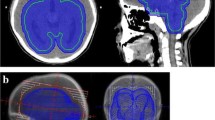Abstract
Objective
The salvage therapy of recurrent embryonal brain tumors in children is disappointing. Temozolomide is a newly developed chemotherapeutic agent in central nervous system tumors. This study analyzed the efficacy of temozolomide on the treatment of recurrent embryonal brain tumors in children.
Materials and methods
There were eight patients, including four with medulloblastoma (MB), three with atypical teratoid/rhabdoid tumor (AT/RT) and one with supratentorial primitive neuroectodermal tumor, whose tumors recurred after surgery and radiotherapy, with or without conventional intravenous cisplastin-based chemotherapy. They all received once daily oral temozolomide (150 mg/m2/day) for five consecutive days in a 28-day cycle. The responsiveness of the tumors to temozolomide was judged by magnetic resonance imaging (MRI) during regular follow-up.
Results
The median treatment cycles received by these eight patients were 17 (range from two to 59 cycles). The follow-up MRI showed no tumor progression in five patients at 6 months and four patients at 12 months. The median progression-free survival (PFS) of the eight patients was 15.7 months (range from 0 to 59 months). Complete response was achieved in one patient with MB accompanying with a long period of PFS for 26 months. Another patient with AT/RT showed partial response accompanying with a long period of PFS for 59 months. The observed adverse effects of temozolomide included nausea, vomiting, headache, constipation, mild marrow suppression, and decreased activity; none of them was severe enough to discontinue the treatment. No patient experienced moderate or severe marrow suppression in this series.
Conclusion
In this preliminary study, oral temozolomide shows promising results on recurrent embryonal brain tumors in children. The adverse effects of temozolomide are mild and tolerable. When conventional chemotherapy fails and/or the adverse response is too severe to tolerate, temozolomide is a reasonable alternative. However, a further well-designed, controlled study and more long-term follow-up are needed to assess the exact role of temozolomide in children with embryonal tumors in brain.




Similar content being viewed by others
References
Baruchel S, Diezi M, Hargrave D, Stempak D, Gammon J, Moghrabi A, Coppes MJ, Fernandez CV, Bouffet E (2006) Safety and pharmacokinetics of temozolomide using a dose-escalation, metronomic schedule in recurrent paediatric brain tumours. Eur J Cancer 42:2335–2342
Brada M, Hoang-Xuan K, Rampling R, Dietrich PY, Dirix LY, Macdonald D, Heimans JJ, Zonnenberg BA, Bravo-Marques JM, Henriksson R, Stupp R, Yue N, Bruner J, Dugan M, Rao S, Zaknoen S (2001) Multicenter phase II trial of temozolomide in patients with glioblastoma multiforme at first relapse. Ann Oncol 12:259–266
Durando X, Thivat E, Gilliot O, Irthum B, Verrelle P, Vincent C, Bay JO (2007) Temozolomide treatment of an adult with a relapsing medulloblastoma. Cancer Invest 25:470–475
Friedman HS, Dolan ME, Pegg AE, Marcelli S, Keir S, Catino JJ, Bigner DD, Schold SC (1995) Activity of temozolomide in the treatment of central nervous system tumor xenografts. Cancer Res 55:2853–2857
Hongeng S, Visudtibhan A, Dhanachai M, Laothamatus J, Chiamchanya S (2002) Treatment of leptomeningeal relapse of medulloblastoma with temozolomide. J Pediatr Hematol Oncol 24:591–593
Kleihues P, Louis DN, Scheithauer BW, Rorke LB, Reifenberger G, Burger PC, Cavenee WK (2002) The WHO classification of tumors of the nervous system. J Neuropathol Exp Neurol 61:215–225
MacDonald TJ, Rood BR, Santi MR, Vezina G, Bingaman K, Cogen PH, Packer RJ (2003) Advances in the diagnosis, molecular genetics, and treatment of pediatric embryonal CNS tumors. Oncologist 8:174–186
Nicholson HS, Krailo M, Ames MM, Seibel NL, Reid JM, Liu-Mares W, Vezina LG, Ettinger AG, Reaman GH (1998) Phase I study of temozolomide in children and adolescents with recurrent solid tumors: a report from the Children's Cancer Group. J Clin Oncol 16:3037–3043
Nicholson HS, Kretschmar CS, Krailo M, Bernstein M, Kadota R, Fort D, Friedman H, Harris MB, Tedeschi-Blok N, Mazewski C, Sato J, Reaman GH (2007) Phase 2 study of temozolomide in children and adolescents with recurrent central nervous system tumors: a report from the Children's Oncology Group. Cancer 110:1542–1550
Poelen J, Bernsen HJ, Prick MJ (2007) Metastatic medulloblastoma in an adult; treatment with temozolomide. Acta Neurol Belg 107:51–54
Sarkar C, Deb P, Sharma MC (2005) Recent advances in embryonal tumours of the central nervous system. Childs Nerv Syst 21:272–293
Saunders DE, Hayward RD, Phipps KP, Chong WK, Wade AM (2003) Surveillance neuroimaging of intracranial medulloblastoma in children: how effective, how often, and for how long? J Neurosurg 99:280–286
Sterba J, Pavelka Z, Slampa P (2002) Concomitant radiotherapy and metronomic temozolomide in pediatric high-risk brain tumors. Neoplasma 49:117–120
Stupp R, Gander M, Leyvraz S, Newlands E (2001) Current and future developments in the use of temozolomide for the treatment of brain tumours. Lancet Oncol 2:552–560
Torres CF, Rebsamen S, Silber JH, Sutton LN, Bilaniuk LT, Zimmerman RA, Goldwein JW, Phillips PC, Lange BJ (1994) Surveillance scanning of children with medulloblastoma. N Engl J Med 330:892–895
Wong TT, Ho DM, Chang KP, Yen SH, Guo WY, Chang FC, Liang ML, Pan HC, Chung WY (2005) Primary pediatric brain tumors: statistics of Taipei VGH, Taiwan (1975-2004). Cancer 104:2156–2167
Yung WK, Albright RE, Olson J, Fredericks R, Fink K, Prados MD, Brada M, Spence A, Hohl RJ, Shapiro W, Glantz M, Greenberg H, Selker RG, Vick NA, Rampling R, Friedman H, Phillips P, Bruner J, Yue N, Osoba D, Zaknoen S, Levin VA (2000) A phase II study of temozolomide vs. procarbazine in patients with glioblastoma multiforme at first relapse. Br J Cancer 83:588–593
Author information
Authors and Affiliations
Corresponding author
Additional information
Chung-Hao Wang and Kai-Ping Chang contributed equally to this paper.
Rights and permissions
About this article
Cite this article
Wang, CH., Hsu, TR., Wong, TT. et al. Efficacy of temozolomide for recurrent embryonal brain tumors in children. Childs Nerv Syst 25, 535–541 (2009). https://doi.org/10.1007/s00381-008-0781-7
Received:
Published:
Issue Date:
DOI: https://doi.org/10.1007/s00381-008-0781-7




